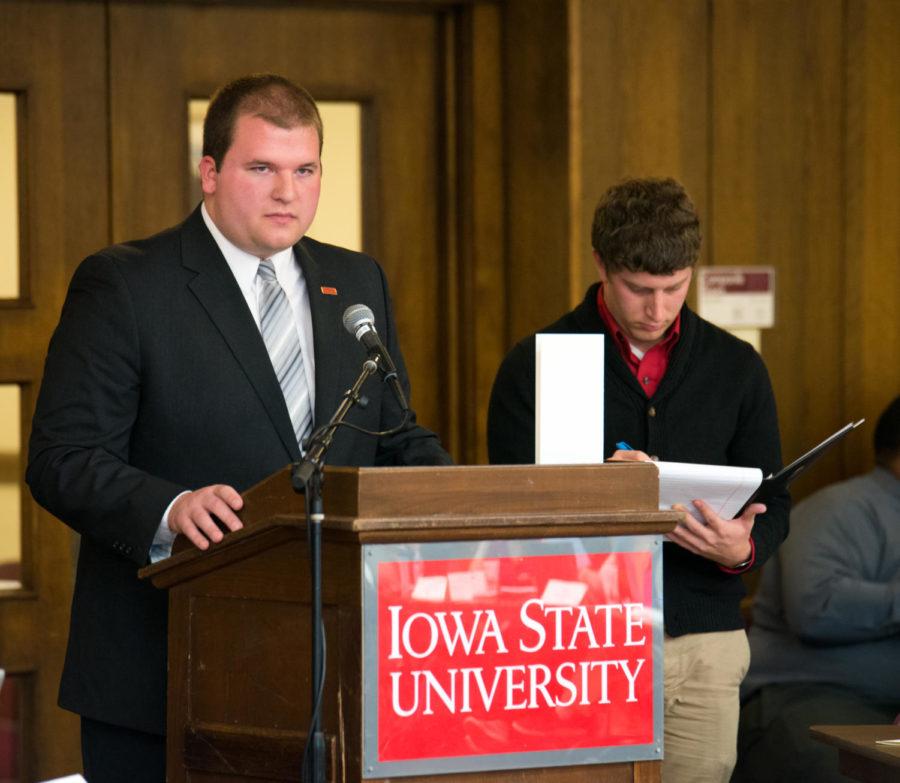GSB eliminates executive compensation
The President of GSB, Spencer Hughes said he originally wanted to take away all executive compensation, but he understood some form of compromise was necessary. He also explained why he believed that it makes sense in the case to allow the stipend for the summer months to remain when come to the scholarship and stipend issues.
November 1, 2013
The Government of Student Body Senate approved a bill to eliminate executive members’ compensation by a vote of 30-2-3.
The bill eliminated the combined $31,165 stipend for the fall and spring used to assist the GSB president, vice president and finance director regarding room and board.
Now the $31,165 will be able to be allocated to student clubs and organizations by GSB. The amount of money allocated for 100 percent tuition for each executive position still remains.
President Spencer Hughes said he originally wanted to take away all executive compensation, but he understood some form of compromise was necessary.
“This was a big issue I wanted to address this year about what was the right route to take how to move forward,” Hughes said. “Some wanted to eliminate the scholarship and keep the stipend. Some wanted to do it the other way.”
Hughes explained why he believed it makes sense in this case to allow the stipend for the summer months to remain.
“A student coming into this position over the summer is not necessarily anticipating that position,” Hughes said. “The distinction is if a student is running for this office they are certainly anticipating being a student in the fall and spring and are able to cover those expenses accordingly.”
Hughes said that while the Executive Branch of GSB dedicates a lot of time to their position, other campus leaders who do not receive any compensation do the same.
“I see the Veishea co-chairs, the Dance Marathon co-chairs, they’re in their office just as much as we are,” Hughes said. “Taking their time to work on improving the student experience, on improving their organizations. They’re getting nothing. In fact, what they’re doing is they’re paying more so that we can get that money because it’s their student activity fee dollars.”
Several students, all for the bill, expressed their opinions at Wednesday’s GSB meeting. One of them was Austin Dorenkamp, senior in computer engineering and co-president of the Engineering Student Council.
“Compared to maybe a million dollars it’s not a ton, but depending on how you use it you can impact a significant number of clubs,” Dorenkamp said.
Dan Rediske, current finance director, talked about how his life has changed as finance director.
“There is a little bit more scrutiny in my day to day life because if I make a mistake, it usually gets written in the Daily,” Rediske said. “That is not so much true in every other position.”
Rediske also said he spends up to 50 hours a week on finance director business and has skipped class and lost points in class to attend meetings related to his position.
Sen. Barry Snell said members of GSB should be students first and GSB members second.
“If anybody can stand here and say that they need the stipend because they miss class or school’s so hard … with all due respect, I’m just gonna lay it out on the line: Tough s—,” Snell said.
Numbers distributed by Hughes, and originally collected by a legislative aide for the University of Texas at Austin Student Government, showed Iowa State is the only Big 12 school to offer both full cost of tuition and a stipend for service in student government executive positions.
Kansas, Texas Christian, and Texas Tech did not provide full information regarding executive compensation.
Sen. Khayree Fitten said he did not believe Iowa State’s situation could be compared to other institutions in the Big 12 Conference.
Fitten also expressed a concern, brought to him by a constituent, that eliminating the executive stipend would prevent those who were not as well off financially from running for GSB executive positions.
Hughes asked why financial situations are concerns of members of the executive branch, but not any other areas of GSB. He also said by federal law students are entitled to student loans up to the cost of attendance, including living expenses and tuition.
Sen. Gage Kensler talked about the number of students outside of GSB who participated in debate and stayed until the vote on the bill.
“I’ve been on GSB for five years. I’ve never seen students stay for this long other than if they had a bill for their [particular] club and we just hadn’t gotten to it yet,” Kensler said.
Hughes said that while the bill may not be perfect, it would make a positive impact.
“I don’t think a number of people in here think that this is the ideal solution, but there’s nothing preventing anyone in this room from taking this after it’s passed and saying we should adjust this and do something a little bit different,” Hughes said.

















